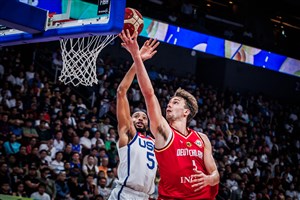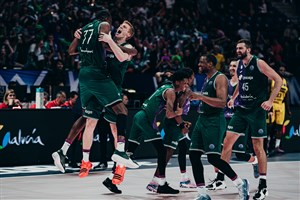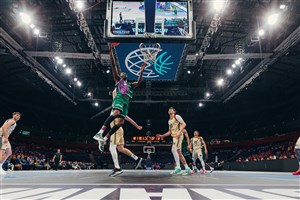
World stage learning process idea not working for African teams
SHEFFIELD (Julio Chitunda's African Message) - The 2014 edition of the FIBA World Championship for Women has come and gone with a clear idea that a lot needs to be done for the African teams.
It was a disappointing end for Mozambique and Angola who finished bottom of the 16-team tournament as a result of their 0-3 records.
With the exception of Mozambique balancing their game against Canada and against the host nation, before receiving standing ovations at Ankara Arena and Leia Dongue confirming why she is one of Africa's top performers, the event sent a few clear messages regarding the worrying future of women's basketball in Africa.
Here are some of the messages I took from my trip to Istanbul for Turkey 2014.
For the benefit of women's basketball, the world expects African teams to be more competitive and scrap once and for all the idea of participating in world stage competition for learning purpose only.
Over the past two decades, Nigeria, Mali, Senegal, Kenya, the DR Congo, Tunisia and more recently Angola and Mozambique haven't made significant progress in FIBA's top women competition as expected.
This does not mean there are not talented basketball players on the continent. The history keeps proving that many Africans are forced to seek greener pastures to develop their basketball talent.
Congolese Mwadi Mabika, Clarisse Machanguana of Mozambique and Mali's Djenebou Sissoko, just to mention a few, are clear examples of the talent coming off the African shores.
To my understanding, this has to do with the way women's basketball (basketball in general) is managed on the continent.
The most recent example that African women's basketball needs urgent reinvention, came from the reigning continental champions Angola, who a couple of years ago insisted their participation at the London Olympics was serving as the starting point to bolster their potential.
Two years have passed and the statistics show an appaling decline.
Here is a comparison of how the Angolans did in London and Istanbul, where they played the Group Phase in this past world championship:
- Seven of the players who played at London 2012 also competed at Turkey 2014. Field Goal percentage - London: 28%; Istanbul: 24.9%.
- Free-Throw percentage - London: 65%; Istanbul: 80%.
- Rebounds per game - London: 37.2; Istanbul: 28.7.
- Assists per game - London: 7.2; Istanbul: 5.3.
- Turnovers per game - London: 17.8; Istanbul: 21.3.
- Points per game - London: 48.6. Istanbul: 41.7.
Local basketball authorities should try to carry out a few measures in order to rescue basketball from stagnation.
These should include:
1. Embrace professionalism within their institutions - team work rather than one-man management is highly-needed to promote and develop the game across.
2. Launch basketball programmes aiming at teaching young players the fundamentals of the game, namely shooting the ball, team work, conditioning etc.
3. Local federations should be able to combine self-sufficiency as well as central government funding.
4. Investing in educational level of coaching staff.
The idea of learning from world stage competition will never work out if new and innovative measures are not taken seriously. Otherwise the African teams will keep struggling for many years to come.
The world is expecting to watch competitiveness. Fans from around the world are eager to buy a ticket to attend or watch on TV the very best players striving on the world stage. They don’t want to see teams being outplayed and thumped.
Despite all the disappointment in the 2014 FIBA World Championship for Women campaign, players are not to blame if they are not fully prepared for the world stage challenge.
Julio Chitunda
FIBA
FIBA's columnists write on a wide range of topics relating to basketball that are of interest to them. The opinions they express are their own and in no way reflect those of FIBA.
FIBA takes no responsibility and gives no guarantees, warranties or representations, implied or otherwise, for the content or accuracy of the content and opinion expressed in the above article.

















